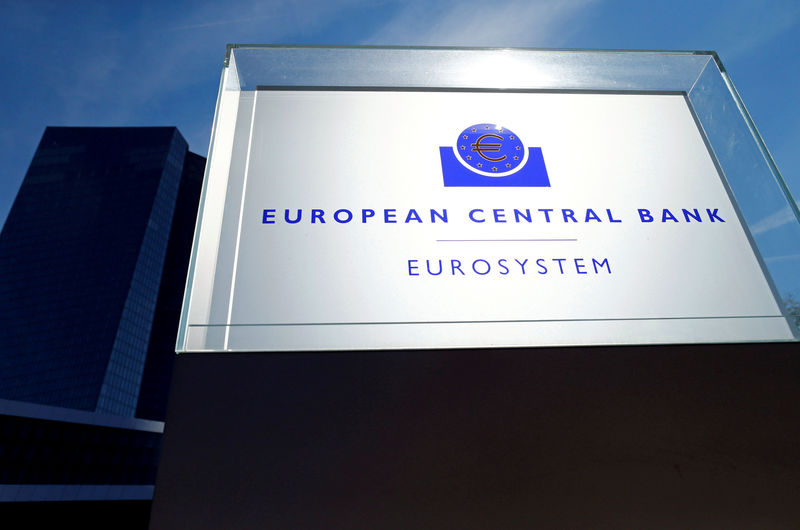By Sumanta Dey
(Reuters) - A stable but lackluster economic outlook will push the European Central Bank to tweak its asset purchase program and announce an extension by year-end, although economists polled by Reuters said a move was unlikely next week.
The ECB has spent over a trillion euros buying government bonds, cut its refinancing rate to zero and adopted a negative deposit rate, besides giving billions of euros in essentially free loans to commercial banks to lend on to customers.
But inflation, which the ECB targets at close to but just below 2 percent, has often dipped below zero in the past couple of years due to weak energy prices, tepid demand from consumers and businesses, and high unemployment in several top economies.
The outlook for prices remained weak in the latest survey and not a single forecaster, in the sample of over 60, had a 2 percent inflation call anywhere over the next year-and-a-half. Inflation was 0.4 percent in September, according to early data.
Over 90 percent of the economists in the poll (conducted over the past week) who had a view on what the ECB would likely do by year-end, picked an extension to the QE program beyond March 2017 as the most likely option.
Almost half of them said some changes in the technical parameters of QE was probable too.
At its meeting on Oct. 20, the ECB is expected to hold monetary policy steady.
"The negative factors affecting the euro zone economy won't suddenly go away in the coming quarters which is why we expect inflation to remain sluggish - possibly below 1 percent," said Johannes Mayr, head of economic research at BayernLB, the top euro zone forecaster in Reuters polls last year.
"That will force the ECB to extend its quantitative easing program beyond March 2017. But in order to do so, the ECB has to modify the program because of the scarcity problem of eligible bonds, especially German bunds."
Mayr added the Governing Council will probably discuss those changes at next week's meeting but a decision will only come in December, similar to what sources familiar with the discussions have told Reuters.
A move by ECB President Mario Draghi at the Dec. 8 meeting could help multiply the impact of the stimulus on the euro's exchange rate, especially since the U.S. Federal Reserve is widely expected to hike rates a week later, boosting the dollar.
The wider poll showed the currency bloc will maintain its current 0.3 percent quarterly growth pace for the rest of 2016, after a surprisingly robust start to the year.
The pace of growth next year will be stymied by a slight slowdown in its number one and two economies, Germany and France, which are expected to expand 1.4 percent and 1.2 percent respectively.
The outlook has improved a little for peripheral economies such as Greece, which is now expected to contract less than earlier thought, and Portugal where growth will likely be stable this year and next.
SELF-IMPOSED RESTRICTIONS
By its own rules, the ECB can only buy debt that yields more than its -0.4 percent deposit rate and restrictions apply on the amount of debt it can buy of a particular country as well as the composition of assets it purchases.
But a steep-fall in global bond yields this year has meant the ECB is running out of sovereign debt to buy and it needs to tweak its own rules to ensure its QE program continues to run.
The 2-year German Schatz, for example, currently yields -0.66 percent making it ineligible for ECB purchases.
"For a six month extension of QE - as we are forecasting - to work, the ECB will need to relax some of its self-imposed purchase restrictions," said Marius Gero Daheim, economist at SEB.
"The most efficient and politically least contentious policy option is to eliminate the deposit rate floor for bond purchases. This would free up a large amount of core and semi-core government bonds ... and allow QE to run until mid-2018."
A few economists said the ECB could expand its monthly QE amount from the current 80 billion euros. Only one forecaster said the ECB would announce a tapering of QE from March or a future date.
(For other stories from the global poll:)
